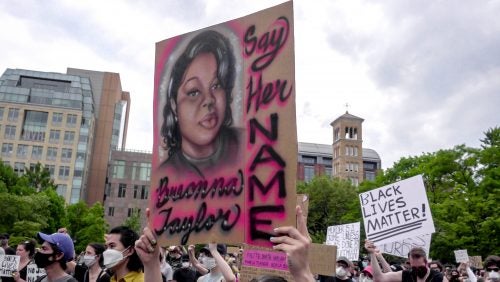One Year After Police Killed Breonna Taylor: Students, Faculty #SayHerName
March 15, 2021

A Black Lives Matter rally in New York City on June, 2020.
One year ago, police officers broke into a Kentucky apartment in the middle of the night and, after a single shot was fired in self defense, unleashed a fusillade of bullets.
Several fatally struck Breonna Taylor, a 26-year-old EMT and aspiring nurse.
According to Toni Deane (L’21), the first Black editor-in-chief of the Georgetown Law Journal, and other advocates for racial justice, Taylor was “Killed for being Black” in a white supremacist society.
To mark the anniversary of Taylor’s tragic death ─ and to cap a year of protests it sparked around the country ─ the journal unveiled a new award in honor of excellence in student social justice scholarship. The inaugural recipient of the Breonna Taylor Prize is Alden Fletcher (L’20), whose winning entry explores how historic preservation law fails low-income and nonwhite communities, such as Washington’s Barry Farms neighborhood. Fletcher plans to donate the $500 prize to two nonprofit social justice groups.
“By awarding this prize annually, the Journal will ensure we say Breonna Taylor’s name for years to come,” the journal’s editorial staff said in a statement ─ echoing the rallying cry of a movement to raise awareness about racist police violence against Black women and girls.
The award, first conceived by outgoing Senior Notes Editor Orion de Nevers (L’21), is one of several steps the journal is taking to combat systemic racism and white supremacy. Staff have also pledged to publish a more diverse selection of authors; train members in unconscious bias and other aspects of cross-cultural communication; appoint a “diversity and inclusion editor;” and advance justice and equity through events, statements, and other activities.
“We have only scratched the surface in our fight to combat racial injustice and systemic inequities as a Law Review, and I am proud of what we have managed to accomplish in just over one year and during a global pandemic,” Deane, whose term as editor-in-chief ended this winter, wrote on the journal’s website.
A drumbeat of advocacy
Deane and journal staff are not alone in their efforts to prioritize justice in the aftermath of Taylor’s death. Distinguished Visitor From Practice Cliff Sloan filed a federal lawsuit last week with other all-star lawyers on behalf of Taylor’s boyfriend, Kenneth Walker. The suit seeks damages from the Louisville Metro Police Department and officers involved in the raid for allegedly violating Walker’s constitutional rights under the Fourth Amendment, which prohibits unreasonable searches and seizures. Walker has also filed suit in state court.
On the night of the raid, plainclothes officers entered the apartment and did not clearly announce they were police officers, Sloan said. Walker, a licensed gun owner, fired a shot in response to what he thought was a home invasion. The officers then fired more than two dozen rounds into two apartments, killing Taylor and taking Walker into custody.
It was a “completely unwarranted invasion by police,” Sloan said, asserting that the “no-knock warrant” officers had obtained to enter the home was based on fraudulent information. “It’s very important for Kenneth Walker to vindicate his constitutional rights,” he added. A legal victory in federal court would be a “very important step for social justice and racial justice.”
Professor Paul Butler, a former prosecutor, also continues a drumbeat of advocacy on behalf of a more just system.
A regulator contributor to major news outlets, Butler has called out former Vice President Mike Pence for a hollow expression of sympathy for Taylor’s family and accused Louisville police officers of manslaughter in The Washington Post ─ a charge no officer involved in the raid has received. On March 13, the one-year anniversary of Taylor’s death, Butler called for justice and shared a video (below) of the opening statement he’d give if he were prosecuting the case.
“I’m proud to join others in the Georgetown Law community to lift up the memory of Breonna Taylor,” Butler said. “These important initiatives are ways that lawyers and law students can use their legal skills to #SayHerName.”